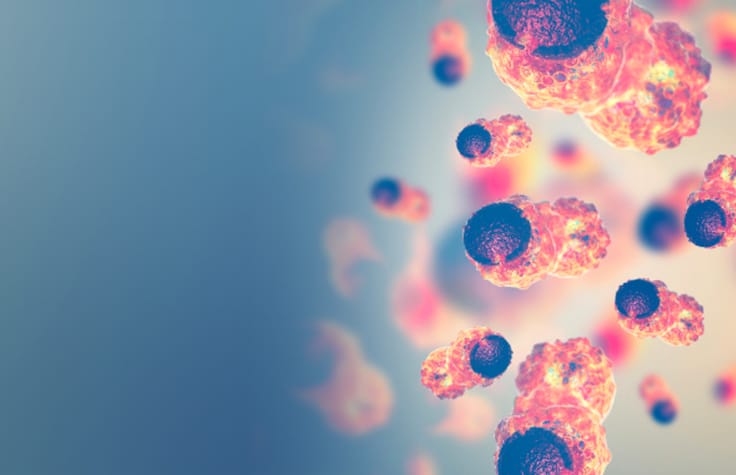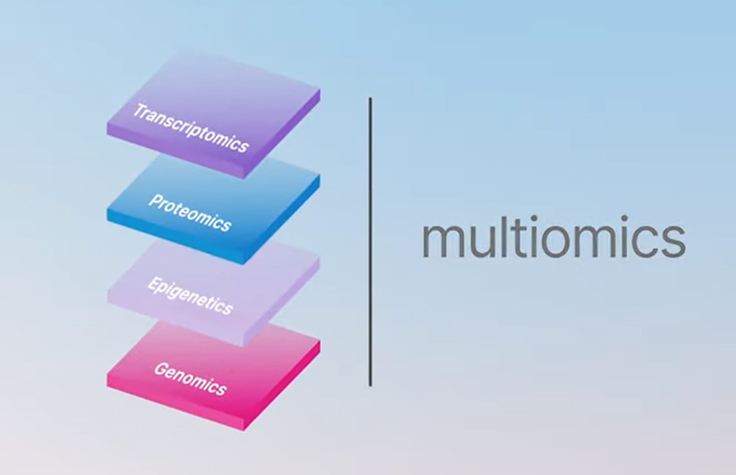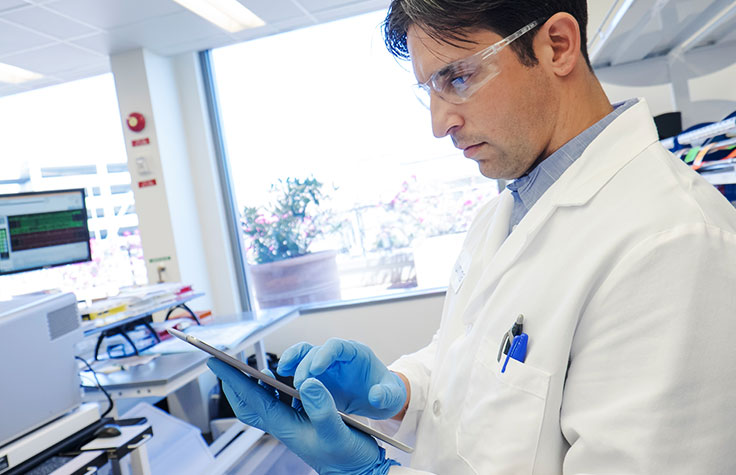Biological Interpretation/Tertiary Analysis
Transform your data into meaningful insights
Leverage cutting-edge variant interpretation solutions to uncover biological insights and drive genomic discovery forward
Answers at your fingertips
Performing biological interpretation experiments enables you to capture critical knowledge on biological processes, disease origins, and novel genetic biomarkers. State-of-the-art bioinformatics tools leverage the power of AI, third-party knowledge sources, and customizable reporting to streamline the path from an NGS sample to a research report.
Biological interpretation applies to a diverse range of applications, test menus, and assay types, supporting analysis for NGS samples on an individual, group, or population-level scale. Illumina provides powerful, integrated interpretation solutions to streamline the journey from sample to answer, enabling you to deliver greater impact, with greater efficiency.

Interpret a broad range and scale of data
Subject-level analysis
Variant detection typically reveals thousands to millions of variants, making variant interpretation a time-consuming and laborious process. To streamline their bioinformatic operations, labs are leveraging automated tools capable of filtering, annotating, and prioritizing the most relevant variants for a subject with high confidence. For optimized impact, integrated knowledge sources are comprehensive, automatically kept up-to-date, and insights generated are inclusive of all citations and references.
Population studies
Global and other large-scale genomic initiatives are generating genomic and multiomic insights by sequencing and analyzing millions of samples across diverse populations. Robust, enterprise-level interpretation solutions that integrate EHR/EMR systems automate reporting and also seamlessly power cohort, biomarker, and other discovery capabilities for population-level research and development.
Interpretation key considerations
When choosing a commercial-grade interpretation software solution, is is important to carefully evaluate a software's functionalities in order to ensure a lab's specific needs are met. Key considerations when researching and identifying a data interpretation software of choice include:
- AI-based algorithms that are accurate in their variant prioritization and transparent in logic, as well as fully automatable for lab SOPs to achieve maximal efficiency and consistency
- Integration of third-party knowledge sources, privately curated databases, and upstream and downstream IT systems including LIMS, data management, EHR/EMR systems, and more
- Compatibility with comprehensive assay options (genomes, exomes, targeted panels, and virtual panels) and applications to ensure future-proofing
- Support for customization of variant interpretation and research report generation based on regional guidelines
- Robust data security, privacy, and compliance features and processes to protect sensitive data
Biological interpretation for specific applications
It's simpler when everything works well together. Tight integration between your sequencer, library prep, and informatics from sample to answer means you can have confidence in your applied data. Illumina offers several integrated biological interpretation tools catered to specific applications, including drug discovery, oncology, genetic disease, microbiology, single-cell analysis, multiomics, and more.
Immuno-oncology Informatics Tools
Improved informatics tools enable neoantigen discovery and tumor microenvironment analysis with Illumina sequencing applications.
Read Technical Note
Uncover insights into the biology of cancer and understand the genetic composition of tumors by interpreting a range of variant types (TMB, MSI, HRD (GIS)) across varying NGS panel menus and cancer samples types (solid, liquid, heme).
Highlighted products:

Drive breakthrough discovery for variants associated with rare-genetic and other hereditary disease and carrier status applications. Interpret a targeted set of genes or assess disease variants genome-wide with efficiency, leveraging automation and explainable AI across comprehensive variant types.
Relevant products:

Detect and identify mutations, characterize unculturable organisms, discover novel strains of infectious diseases like COVID-19 strains, and examine host-pathogen interactions with powerful bioinformatic analyses enabled as an integrated workflow.
Relevant products:

Examine the genomes and transcriptomes of individual cells, allowing a new level of resolution. Explore the distinct biology of individual cells amongst complex tissues and better understand cellular subpopulations. Leverage DRAGEN for single-cell analysis on board the NextSeq 2000 as well as other Illumina and third party applications.
Relevant products:

Integrate analyses across genomics, transcriptomics, and epigenetics to measure gene expression, gene activation, and protein levels. Connect genotypic to phenotypic data for a more comprehensive understanding of development and disease. Discover novel links between biological entities, identify biomarkers and profile mutations, and obtain a full cellular read-out not found in single omics approaches.
Relevant products:

Accelerate drug discovery efforts and better understand genetic variants and biomarkers associated with various diseases. Inform drug target discovery and validation while operationalizing your workflow through an enterprise-level solution. Create a unified data infrastructure specific for your organizations needs around analysis pipelines, data science, controlled collaboration, and data management. Ensure optimized integration, continuous learning, and knowledge from enterprise-level data.
Relevant products:
Related applications
Illumina bioinformatics software offers solutions for a variety of applications including microarray data analysis, microbiology, agrigenomics, and more.
Sequencing data analysis
Sequence organisms without a reference genome, such as novel microbes, animals, or plants. Choose from a variety of intuitive bioinformatics tools for sequence assembly.
Microarray Data Analysis
Access bioinformatics tools for genotyping and methylation microarray experimental design, sample tracking, and data analysis applications. Reduce time to answer so you can spend more time doing research.
Polyploid Organism Array Data Analysis
Perform genotyping data analysis of polyploid organisms such as wheat and potato using the Polyploid Genotyping Module in GenomeStudio.
Featured Biological Interpretation Content
Genomic Data Mining and Interpretation
See examples of distinguished universities and pharmaceutical companies that have cited BaseSpace Correlation Engine in peer-reviewed publications.
Immuno-oncology Bioinformatics Tools
Improved informatics tools enable neoantigen discovery and tumor microenvironment analysis.
Single-Cell RNA Sequencing
Study cellular differences often masked by bulk sampling. Explore high- and low-throughput single-cell analysis methods.
Interested in receiving newsletters, case studies, and information on genomic analysis techniques?
Enter your email address.
